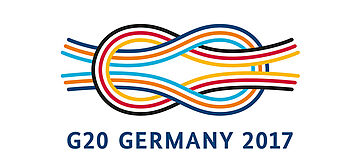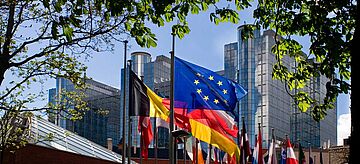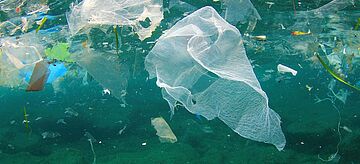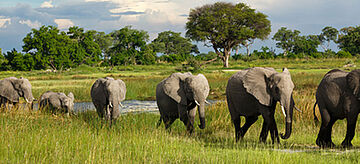Germany’s G20 Presidency

Germany took over the presidency of the G20 on 1 December 2016. Environmental issues will play an important role in addition to economic, foreign policy and security issues. Representatives of the G20 countries came together for several meetings and conferences over the course of 2017 to discuss international climate policies, the 2030 Agenda for Sustainable Development, resource efficiency, marine litter and illegal trade in wildlife/poaching. These topics are also addressed in the Leaders’ Declaration, which was adopted by the heads of state and government at their meeting in Hamburg on 7 and 8 July 2017. In doing so, they firmly embedded environmental protection in the G20 process as one of the key global issues.
International climate policy

The G20 summit in Hamburg sent a clear signal in favour of implementing the Paris Agreement, initiating a global energy transition as well as a new, sustainable growth model to modernise the G20’s economies and of supporting the transformation process in developing countries. Despite the difficult circumstances, the German G20 Presidency has thus succeeded in embedding the implementation of the Paris Agreement in G20 policies and in keeping up the vital dialogue with the US. In the Leaders’ Declaration, 19 of the countries made it unmistakably clear that the Paris Agreement is irreversible, and they committed to fully implementing the agreement. A paragraph laying out the US’s deviating position made it possible for a joint passage on climate policy to be adopted in the declaration. The G20 heads of state and government acknowledge that the US wishes to withdraw from the Paris Agreement. With a view to the clear commitment to the Paris Agreement of all the other states, it was deemed acceptable for the US to set out that it wants to support other countries in the “clean” use of fossil fuels. After the summit, the Turkish President announced his intention not to ratify the agreement. This announcement, however, has a different background than the US withdrawal. Turkey’s issue is whether it will be given the status of industrialised or developing country and its consequent access to international financing mechanisms. This question already came up during the negotiations in Paris and still requires a solution. It was clear that Turkey would ratify the agreement only after a solution has been found.
The Leaders’ Declaration also makes reference to the results of the OECD report Investing in Climate, Investing in Growth. Nineteen of the G20 countries underlined their unequivocal position on the Paris Agreement by adopting the G20 Hamburg Climate and Energy Action Plan for Growth. This action plan is a clear commitment to the long-term goals of the Paris Agreement (holding the increase in the global average temperature to well below two degrees celsius and pursuing efforts to limit the temperature increase to 1.5 degrees celsius; increasing the ability to adapt to the adverse impacts of climate change; changing the course of global finance flows) and sets out specific measures for a swift and comprehensive implementation of the agreement. The countries will lead the way in implementing their nationally determined contributions (NDCs), draw up long-term climate strategies and enhance conditions for adjusting public and private investments to the goals of the Paris Agreement. The basis for these goals is the G20’s work on green finance and the recommendations established by the Task Force on Climate-related Financial Disclosure for large companies to disclose their climate risks voluntarily. In addition, the G20 countries recognise market-based approaches (for example emissions trading systems) as potential climate action tools and call on multilateral development banks to increase cooperation in order to support developing countries in implementing measures together with the private sector. A global partnership for risk insurance aims to strengthen the resilience of the poorest against the consequences of climate change. Cities, regions, companies, investors and other non-governmental actors are encouraged to continue actively supporting the implementation of the Paris Agreement.
The process alone of establishing the G20 Sustainability Working Group on energy and climate issues has intensified the exchange and cooperation between G20 countries. It would be appreciated if the upcoming Argentinian G20 Presidency continued this enhanced cooperation on climate action and energy.
2030 Agenda for Sustainable Development

The G20 heads of state and government announced the clear commitment of the 20 largest national economies to the global Sustainable Development Goals laid out in the 2030 Agenda and called for an ambitious, comprehensive and swift implementation. This strengthens and supplements the structural transition towards a more sustainable development that gives greater consideration to social, ecological and economic aspects. By adopting the Hamburg Update, which builds upon the G20 Action Plan on the 2030 Agenda for Sustainable Development of 2016, the heads of state and government agreed on additional concrete steps for implementation. This will help advance the implementation of the 2030 SDGs on both national and international level. A voluntary mechanism for peer learning was adopted, too, which will offer interested states a platform for sharing successful approaches to implementing the 2030 Agenda, also beyond G20 members. A number of countries have already declared their interest in this format. In addition, the heads of state and government have launched two initiatives which reflect the G20’s commitment to sustainable development and will contribute to the implementation of the 2030 Agenda: the G20 Resource Efficiency Dialogue and the G20 Action Plan on Marine Litter.
Resource Efficiency

Sound resource management will be an integral element of the G20 agenda in future. By establishing the G20 Resource Efficiency Dialogue, the G20 countries want to advocate a resource-efficient and sustainable global economy and promote sustainable production and consumption patterns. Governments will work together with experts, enterprises and the public for this purpose. The aim is to use natural resources such as raw materials, water and energy more efficiently and soundly throughout their entire life cycle in order to achieve the global Sustainable Development Goals (SDGs), combat poverty and climate change and protect the environment. In addition to the implementation of the relevant SDGs, the topics of the dialogue will include scenarios for future resource consumption and an exchange on successful national measures and examples from practice such as the economic use of raw materials and water, waste management and the resource-efficient design of products, production processes and infrastructure. The launch event for the G20 Resource Efficiency Dialogue is scheduled to take place in Berlin on 27 November 2017.
Marine litter

Marine litter has become a globally growing problem which can only be dealt with by acting together. The G20 heads of state and government have confirmed their willingness to protect the marine environment by adopting the G20 Action Plan on Marine Litter during the German Presidency in 2017. The action plan deals with both land and sea-based sources of marine litter. It focuses on measures of waste avoidance, waste management and resource efficiency and includes socioeconomic aspects, awareness-raising and research. There is significant potential to reduce marine litter, which is mainly land-based, in emerging economies and developing countries. In these countries especially, the action plan can therefore give the necessary political impetus to address marine litter at all levels and achieve a noteworthy reduction of pollution.
Illegal trade in species/poaching

For the first time in the G20 process, heads of state and government also agreed to jointly take on the global problems of poaching and illegal trade in wildlife. At an estimated annual volume of between eight and twenty billion euros, illegal trade in wild animals, plants and wildlife products is one of the most lucrative activities of organised crime, almost as profitable as drug or arms trafficking. Illegal wildlife trade has devastating consequences not only for endangered species such as elephants or rhinos, but also for economic development and security in many countries. Apart from the rising demand, especially in Asia, corruption is one of the main reasons for this trend. In order to combat corruption more effectively in this area, the G20 adopted the G20 High Level Principles on Combatting Corruption Related to Illegal Trade in Wildlife and Wildlife Products.
